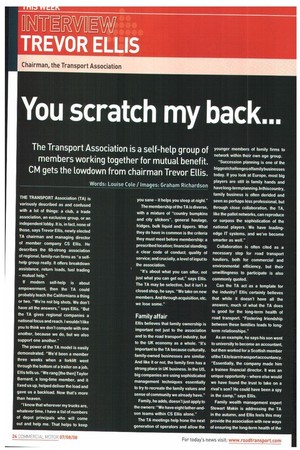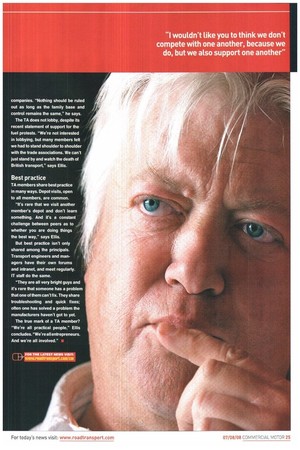You scratch my back...
Page 24

Page 25

If you've noticed an error in this article please click here to report it so we can fix it.
The Transport Association is a self-help group of members working together for mutual benefit. CM gets the lowdown from chairman Trevor Ellis.
Words: Louise Cote / Images: Graham Richardson
THE TRANSPORT Association (TA) is variously described as and confused with a lot of things: a club, a trade association, an exclusive group, or an independent lobby. II is, in fact, none of those, says Trevor Ellis, newly elected TA chairman and managing director of member company CS Ellis. He describes the 60-strong association of regional, family-run firms as "a selfhelp group really. It offers breakdown assistance, return loads, fuel trading mutual help."
If modern self-help is about empowerment, then the TA could probably leach the Californians a thing or two. "We're not big shots. We don't have all the answers," says Ellis. "But the TA gives regional companies a national locus and reach. I wouldn't like you to think we don't compete with one another, because we do, but we also support one another."
The power of the TA model is easily demonstrated. "We'd been a member three weeks when a forklift went through the bottom of a trailer on a job, Ellis tells us. "We rang [the then] Taylor Barnard, a long-time member, and it fixed us up, helped deliver the load and gave us a back load. Now that's more than heaven.
"I know that wherever my trucks are, whatever time, I have a list of numbers of depot principals who will come out and help me. Thal helps to keep you sane it helps you sleep at night."
The membership of the TA is diverse, with a mixture of "country bumpkins and city slickers", general haulage, fridges, bulk liquid and tippers. What they do have in common is the criteria they must meet before membership: a prescribed location; financial standing; a clear code of conduct; quality of service; and crucially, a level of input to the association.
"Il's about what you can offer, not just what you can get out," says Ellis. The TA may be selective, but it isn't a closed shop, he says. "We take on new members. And through acquisition, etc, we lose some."
Family affair
Ellis believes that family ownership is important not just to the association and to the road transport industry, but to the UK economy as a whole. 'It's important to the TA because culturally, family-owned businesses are similar. And like it or not, the family firm has a strong place in UK business. In the US, big companies are using sophisticated management techniques essentially to try lo recreate the family values and sense of community we already have."
Family, he adds, doesn't just apply to the owners: "We have eight father-andson teams within CS Ellis alone."
The TA meetings help hone the next generation of operators and allow the younger members of family firms to network within their own age group.
"Succession planning is one of the biggestchallengesoffamily businesses today. If you look at Europe, most big players are still in family hands and have long-term planning.Inth iscountry, family business is often derided and seen as perhaps less professional, but through close collaboration, the TA, like the pallet networks, can reproduce or surpass the sophistication of the national players. We have leadingedge IT systems, and we've become smarter as well."
Collaboration is often cited as a necessary step for road transport hauliers, both for commercial and environmental efficiency, but their unwillingness to participate is also commonly quoted.
Can the TA act as a template for the industry? Ellis certainly believes that while it doesn't have all the answers, much of what the TA does is good for the long-term health of road transport. "Fostering friendship between these families leads to longterm relationships."
As an example, he says his son went to university to become an accountant, but then worked for a Scottish member of the TA to learntransport accountancy. "Essentially, the company made him a trainee financial director. It was an unique opportunity where else would we have found the trust to take on a rival's son? He could have been a spy in the camp." says Ellis.
Family wealth management expert Stewart Makin is addressing the TA in the autumn, and Ellis feels this may provide the association with new ways of ensuring the long-term health of the companies. "Nothing should be ruled out as long as the family base and control remains the same," he says.
The TA does not lobby, despite its recent statement of support for the fuel protests. "We're not interested in lobbying, but many members felt we had to stand shoulder to shoulder with the trade associations. We can't just stand by and watch the death of British transport," says Ellis.
Best practice
TA members share best practice in many ways. Depot visits, open to all members, are common.
"It's rare that we visit another member's depot and don't learn something. And it's a constant challenge between peers as to whether you are doing things the best way," says Ellis.
But best practice isn't only shared among the principals. Transport engineers and managers have their own forums and intranet, and meet regularly. IT staff do the same.
"They are all very bright guys and it's rare that someone has a problem that one of them can't fix. They share troubleshooting and quick fixes; often one has solved a problem the manufacturers haven't got to yet.
The true mark of a TA member? "We're all practical people." Ellis concludes. "We're all entrepreneurs. And we're all involved."


























































































































































